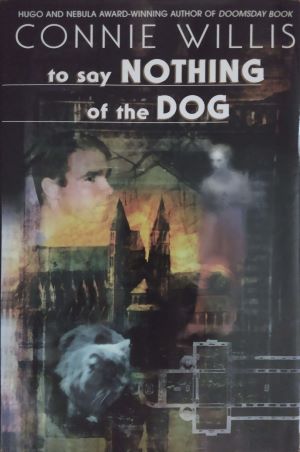 Note: To Say Nothing of the Dog is the second novel in the Oxford Time Travel series however no familiarity is required with the previous novel, Doomsday Book, to thoroughly enjoy this story.
Note: To Say Nothing of the Dog is the second novel in the Oxford Time Travel series however no familiarity is required with the previous novel, Doomsday Book, to thoroughly enjoy this story.
To Say Nothing of the Dog is, like the rest of Connie Willis's Oxford Time Travel series, at its heart a comedy of manners. This is however is an overly simplistic evaluation. The novel is a sci-fi classic; witness the Hugo it collected in 1999. It is a mystery in the vein of Agatha Christie and Dorothy Sayers. It is a literary deconstruction of, and shameless homage to, the tropes of Victorian England. It is in my opinion side-splittingly brilliant.
The year is 2057. Time travel is real and financially unremunerative as the universe protects itself against meddling through a process known as “slippage”. As a result all time travel is managed by the History Department of Oxford University; or at least it was until Lady Schrapnell began requisitioning every trip into the past to find and document a mysterious object called “The Bishop’s Birdstump” which was destroyed during the bombing raid on Coventry in WWII.
Enter Ned Henry, an Oxford student and time traveler who is suffering from “time-lag” a mental disorder brought on by one too many trips into the past. On the verge of nervous breakdown, he is sent to 1888 Victorian England to convalesce, and hide from the insistent demands of Lady Schrapnell.
He also has a mission, discover how someone else in the same time period apparently violated the causal laws of time travel. Unfortunately, Ned’s is a rather extreme case of time lag and upon arrival in 1888, he forgets everything about his mission. This is the beginning of a long comedy of errors that eventually sees him ensconced in the English country manor of Muching’s End. There he meets a second Oxford time traveler Verity Kindle who is searching for clues about Lady Schrapnell’s past.
The book contains a huge collection of characters who manage to both conform to and transcend the literary expectations of their tropes. There are desperate time travelers, eccentric Oxford dons, clueless suitors, idle gentry, flamboyant charlatans, plucky heroes and heroines; all of whom are bound up in a web of happenstance and interactions that would have made Alexandre Dumas proud.
My final comment on this book is this: find a physical copy to sit down and enjoy. I first experienced this book in audio format, and I enjoyed every minute of it, Steven Crossley is a great narrator. However, it is not only the book’s story that pays homage to the classic form of Victorian literature. The style and formatting of the text are a throwback to a bygone age of book publishing. This is visible in the flowing cursive script of each epigram. It can be seen in the chapter headings which briefly summarize the events to follow. And it is there in the impassive rendering of a bulldog’s face which greets the reader at the start of each chapter.
So, go find a cup of tea, or a mug of coffee and sit down with this enjoyable sci-fi romp.
For those who care about such things, here is my semi-arbitrary Parental Guidance Rating: 13+ for Mature Themes
